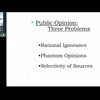briefly
From Categories to Categorization: A Social Perspective on Market Categorization
Research in the Sociology of Organizations, Volume 51, 2017 Abstract The popularity of research into categories has grown in recent decades and shows no sign of abating. This introductory article takes
Climate Change and Optimum Population
The Monist, Volume 102, Issue 1, pages: 42-65. doi.org/10.1093/monist/ony021 Abstract It is often claimed that reducing population size would be advantageous for climate change mitigation, on the ground
Universal procreation rights and future generations
Journal of Applied Philosophy Abstract It is often acknowledged that public policies can constrain people’s procreative opportunities, in some cases even infringing their procreative rights. However, a
Collective behaviour and collective cognition
Jens Krause, Humboldt University, Berlin In his talk Krause will explain some of the basic principles of collective behaviour and collective cognition. Some of the case studies are based on experiments

Klaus Georg Hansen: Greenland – 300 years of colonisation
Since the formal colonisation of Greenland in 1721 by the Norwegian-Danish missionary Hans Egede Greenland has experienced five 'constitutional' breaks. Thus, seven distinct colonial eras can be ident
Epistemic Privilege and Victims’ Duties to Resist their Oppression
Journal of Applied Philsophy, DOI: 10.1111/japp.12255. Abstract Victims of injustice are prominent protagonists in efforts to resist injustice. I argue that they have a duty to do so. Extant accounts of
Victor Galaz: Big Money, Big Change – Exploring the Links Between Tax Havens and Global Sustainability
Victor Galaz, deputy director and associate professor at the Stockholm Resilience Centre.AbstractThe role of “tax havens” in the global economy has gained increasing attention in recent years. The dis
James Fishkin: Is Deliberation an Antidote to Extreme Partisan Polarization? Reflections on “America in One Room”
AbstractIs Deliberation an Antidote to Extreme Partisan Polarization? Reflections on “America in One Room” Register here to join the seminar This talk is positioned at the intersectionof two literatures

James Fishkin: Is Deliberation an Antidote to Extreme Partisan Polarization?
James Fishkin: Is Deliberation an Antidote to Extreme Partisan Polarization? Reflections on “America in One Room” This talk is positioned at the intersectionof two literatures: partisan polarizatio
Discrimination and Future Generations
In: Mosquera, J. & O. Torpman (ed.),Studies on Climate Ethics and Future Generations vol. 6. Working Paper Series 2024:10–17 Abstract In this paper, I analyse whether the present generation’s choices. This has been tentatively suggested in both legal theory and philosophy; I review such suggestions briefly in section 1. However, a more rigorous analysis – outlining the concept, relevant grounds, and wrong-making features of discrimination, and applying these to future generations – is still lacking. To address this lacuna, I propose a theory of discrimination and analyse why it might seem to apply – yet ultimately fails to apply – to the differential treatment of future generations. More specifically, I propose a definition of discrimination (section 2.1) and an account of the moral wrongness of discrimination (section 2.2). I moreover explore the connection between discrimination and theories of social (in)justice (section 2.3). I then apply this theory to the problem of differential treatment of future generations. While discrimination may occur between collectives, such as generations (section 3.1), my analysis shows that the specific temporal status of future generations is not comparable to other grounds of discrimination, such as gender or race (section 3.2). Moreover, due the non-identity problem and the problem of lack of a “community of social meaning” between generations, future generations cannot be claimed to be subjected to worse treatment by the present generation (section 3.3). Hence, their differential treatment due to the present generation’s choices does not amount to discrimination. Section 4 concludes and outlines some upshots of my analysis.








